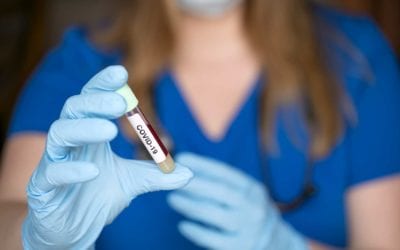Cold, Flu, COVID, Oh My!
Now that our kiddos are back in school, we know that it’s just a matter of time before they bring home and spread around icky germs. The real question is–what are they sick with? We know that there are several viruses that get kicked around in the fall and winter, but now there is a new virus that has thrown quite a wrench in your average sick season. That virus is SARS-CoV-2, commonly known as COVID-19. Perhaps you’ve heard of it?
The real question is, how do you know what virus your kid is sick with? Of course, the most accurate way to tell is to get a test done. Here at Mainstreet Pediatrics, we offer on-site rapid flu and RSV (Respiratory Syncytial Virus) tests, as well as COVID tests that we can receive back within just a few business days. But below is a guide to let you know what symptoms you can expect with each kind of infection, as well as some tips on treating your kiddo.
COLDS: Viral respiratory infections are quite common among all ages during colder seasons, but they are especially common in our younger kiddos. These viruses are highly contagious and spread like wildfire in daycares and schools. Typical cold symptoms include runny nose, sneezing, coughing, and sometimes a low-grade fever. Other symptoms may include diminished appetite, trouble sleeping, and increased crabbiness. There may also be complications that result from a cold, such as a sinus or ear infection.
There isn’t a specific medicine that will clear up a cold, but it can help to treat your child’s symptoms as they fight off the virus. Pushing fluids, steam showers, and humidifiers can break up those mucous secretions. In addition, acetaminophen (Tylenol) can be beneficial in increasing comfort.
FLU: The flu is caused by the influenza virus. The best way to prevent the flu, or at least to prevent the worst of the symptoms, is to receive the flu vaccination. The youngest age a kiddo can receive the flu vaccine is 6 months. Flu symptoms are similar to cold symptoms but are usually much worse. Flu symptoms usually hit fast and hard–high fever/chills, congestion, and cough, sore throat, headache and body aches, loss of appetite, and fatigue. These symptoms last about a week, but can take another week before they entirely improve. The symptoms can be treated using the same methods described above for colds, but there are some antiviral medications on the market that your pediatrician can prescribe as well.
COVID: Brought to you by the novel coronavirus (SARS-CoV-2), COVID-19 has only been around for a short time. So, as time goes on we are continuing to learn more and more. But here’s what we know so far.
COVID-19 is accompanied by a range of symptoms that presents between a few days and a few weeks after exposure. There may be one of more of the following symptoms present: fever or chills, cough, shortness of breath, muscle aches, headaches, loss of taste/smell, sore throat, congestion/runny nose, nausea/vomiting, and diarrhea.
There isn’t currently a vaccine, so the best measure of protection is using caution and implementing extra hygienic measures, such as washing hands, masking up, and avoiding busy spaces that accumulate a number of germs. If your child does test positive, the same symptomatic care can be utilized as for the cold and flu.
Sick kiddos is an inevitability, but remember that we are always here to help answer any questions or concerns that may arise.






